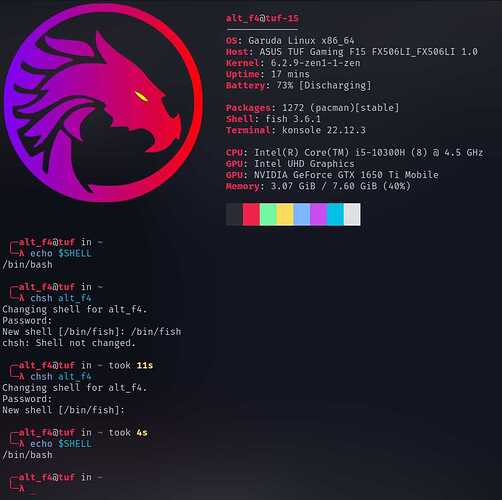╭─alt_f4@tuf in ~
╰─λ garuda-inxi
System:
Kernel: 6.2.9-zen1-1-zen arch: x86_64 bits: 64 compiler: gcc v: 12.2.1
parameters: BOOT_IMAGE=/@/boot/vmlinuz-linux-zen
root=UUID=d581b092-954c-495c-b56c-3855444ad049 rw rootflags=subvol=@
quiet quiet splash rd.udev.log_priority=3 vt.global_cursor_default=0
resume=UUID=2be48266-c1a0-4ea8-9c01-faaf3db8bf5f loglevel=3 ibt=off
Desktop: KDE Plasma v: 5.27.3 tk: Qt v: 5.15.8 wm: kwin_x11 vt: 1 dm: SDDM
Distro: Garuda Linux base: Arch Linux
Machine:
Type: Laptop System: ASUSTeK product: ASUS TUF Gaming F15 FX506LI_FX506LI
v: 1.0 serial: <superuser required>
Mobo: ASUSTeK model: FX506LI v: 1.0 serial: <superuser required>
UEFI: American Megatrends v: FX506LI.310 date: 11/26/2021
Battery:
ID-1: BAT1 charge: 29.1 Wh (70.5%) condition: 41.3/48.1 Wh (85.9%)
volts: 11.2 min: 11.7 model: ASUS A32-K55 type: Li-ion serial: N/A
status: discharging
CPU:
Info: model: Intel Core i5-10300H bits: 64 type: MT MCP arch: Comet Lake
gen: core 10 level: v3 note: check built: 2020 process: Intel 14nm family: 6
model-id: 0xA5 (165) stepping: 2 microcode: 0xF4
Topology: cpus: 1x cores: 4 tpc: 2 threads: 8 smt: enabled cache:
L1: 256 KiB desc: d-4x32 KiB; i-4x32 KiB L2: 1024 KiB desc: 4x256 KiB
L3: 8 MiB desc: 1x8 MiB
Speed (MHz): avg: 2075 high: 2500 min/max: 800/4500 scaling:
driver: intel_pstate governor: powersave cores: 1: 2500 2: 2500 3: 2500
4: 800 5: 2500 6: 800 7: 2500 8: 2500 bogomips: 39999
Flags: avx avx2 ht lm nx pae sse sse2 sse3 sse4_1 sse4_2 ssse3 vmx
Vulnerabilities: <filter>
Graphics:
Device-1: Intel CometLake-H GT2 [UHD Graphics] vendor: ASUSTeK driver: i915
v: kernel arch: Gen-9.5 process: Intel 14nm built: 2016-20 ports:
active: eDP-1 empty: none bus-ID: 00:02.0 chip-ID: 8086:9bc4
class-ID: 0300
Device-2: NVIDIA TU117M [GeForce GTX 1650 Ti Mobile] vendor: ASUSTeK
driver: nvidia v: 530.41.03 alternate: nouveau,nvidia_drm non-free: 530.xx+
status: current (as of 2023-03) arch: Turing code: TUxxx
process: TSMC 12nm FF built: 2018-22 pcie: gen: 3 speed: 8 GT/s lanes: 16
bus-ID: 01:00.0 chip-ID: 10de:1f95 class-ID: 0300
Device-3: Sonix USB2.0 HD UVC WebCam type: USB driver: uvcvideo
bus-ID: 1-7:3 chip-ID: 322e:202c class-ID: 0e02
Display: x11 server: X.Org v: 21.1.8 with: Xwayland v: 23.1.1
compositor: kwin_x11 driver: X: loaded: modesetting,nvidia unloaded: nouveau
alternate: fbdev,intel,nv,vesa dri: iris gpu: i915 display-ID: :0
screens: 1
Screen-1: 0 s-res: 1920x1080 s-dpi: 96 s-size: 508x285mm (20.00x11.22")
s-diag: 582mm (22.93")
Monitor-1: eDP-1 model: Najing CEC Panda 0x004d built: 2019 res: 1920x1080
dpi: 142 gamma: 1.2 size: 344x194mm (13.54x7.64") diag: 395mm (15.5")
ratio: 16:9 modes: 1920x1080
API: OpenGL v: 4.6 Mesa 23.0.1 renderer: Mesa Intel UHD Graphics (CML GT2)
direct-render: Yes
Audio:
Device-1: Intel Comet Lake PCH cAVS vendor: ASUSTeK driver: snd_hda_intel
v: kernel alternate: snd_soc_skl,snd_sof_pci_intel_cnl bus-ID: 00:1f.3
chip-ID: 8086:06c8 class-ID: 0403
Device-2: NVIDIA vendor: ASUSTeK driver: snd_hda_intel v: kernel pcie:
gen: 3 speed: 8 GT/s lanes: 16 bus-ID: 01:00.1 chip-ID: 10de:10fa
class-ID: 0403
API: ALSA v: k6.2.9-zen1-1-zen status: kernel-api tools: N/A
Server-1: PipeWire v: 0.3.67 status: active with: 1: pipewire-pulse
status: active 2: wireplumber status: active 3: pipewire-alsa type: plugin
4: pw-jack type: plugin tools: pactl,pw-cat,pw-cli,wpctl
Network:
Device-1: MEDIATEK MT7921 802.11ax PCI Express Wireless Network Adapter
vendor: AzureWave driver: mt7921e v: kernel pcie: gen: 2 speed: 5 GT/s
lanes: 1 bus-ID: 03:00.0 chip-ID: 14c3:7961 class-ID: 0280
IF: wlp3s0 state: up mac: <filter>
Device-2: Realtek RTL8111/8168/8411 PCI Express Gigabit Ethernet
vendor: ASUSTeK driver: r8169 v: kernel pcie: gen: 1 speed: 2.5 GT/s
lanes: 1 port: 3000 bus-ID: 04:00.0 chip-ID: 10ec:8168 class-ID: 0200
IF: enp4s0 state: down mac: <filter>
Bluetooth:
Device-1: IMC Networks Wireless_Device type: USB driver: btusb v: 0.8
bus-ID: 1-14:4 chip-ID: 13d3:3563 class-ID: e001 serial: <filter>
Report: bt-adapter ID: hci0 rfk-id: 0 state: up address: <filter>
Drives:
Local Storage: total: 476.94 GiB used: 32.45 GiB (6.8%)
SMART Message: Unable to run smartctl. Root privileges required.
ID-1: /dev/nvme0n1 maj-min: 259:0 vendor: Micron model: 2210 MTFDHBA512QFD
size: 476.94 GiB block-size: physical: 512 B logical: 512 B speed: 31.6 Gb/s
lanes: 4 type: SSD serial: <filter> rev: P6MA001 temp: 39.9 C scheme: GPT
Partition:
ID-1: / raw-size: 57.59 GiB size: 57.59 GiB (100.00%)
used: 32.45 GiB (56.3%) fs: btrfs dev: /dev/nvme0n1p9 maj-min: 259:9
ID-2: /boot/efi raw-size: 512 MiB size: 511 MiB (99.80%)
used: 612 KiB (0.1%) fs: vfat dev: /dev/nvme0n1p8 maj-min: 259:8
ID-3: /home raw-size: 57.59 GiB size: 57.59 GiB (100.00%)
used: 32.45 GiB (56.3%) fs: btrfs dev: /dev/nvme0n1p9 maj-min: 259:9
ID-4: /var/log raw-size: 57.59 GiB size: 57.59 GiB (100.00%)
used: 32.45 GiB (56.3%) fs: btrfs dev: /dev/nvme0n1p9 maj-min: 259:9
ID-5: /var/tmp raw-size: 57.59 GiB size: 57.59 GiB (100.00%)
used: 32.45 GiB (56.3%) fs: btrfs dev: /dev/nvme0n1p9 maj-min: 259:9
Swap:
Kernel: swappiness: 133 (default 60) cache-pressure: 100 (default)
ID-1: swap-1 type: zram size: 7.6 GiB used: 0 KiB (0.0%) priority: 100
dev: /dev/zram0
ID-2: swap-2 type: partition size: 512 MiB used: 0 KiB (0.0%) priority: -2
dev: /dev/nvme0n1p7 maj-min: 259:7
Sensors:
System Temperatures: cpu: 49.0 C pch: 56.0 C mobo: N/A
Fan Speeds (RPM): cpu: 0
Info:
Processes: 266 Uptime: 22m wakeups: 1 Memory: 7.6 GiB used: 3.63 GiB (47.7%)
Init: systemd v: 253 default: graphical tool: systemctl Compilers:
gcc: 12.2.1 Packages: pm: pacman pkgs: 1272 libs: 334 tools: octopi,paru
Shell: fish v: 3.6.1 default: Bash v: 5.1.16 running-in: konsole
inxi: 3.3.26
Garuda (2.6.16-1):
System install date: 2023-04-06
Last full system update: 2023-04-07
Is partially upgraded: No
Relevant software: snapper NetworkManager dracut nvidia-dkms
Windows dual boot: Probably (Run as root to verify)
Failed units:
Hello, I'm trying to change my shell to fish in fish konsole. I have changed it from bash to fish in garuda assistant (under : setting), also from my konsole configuration setting (profile). Although shell type is described as fish when I open konsole but still it's running bash shell.
